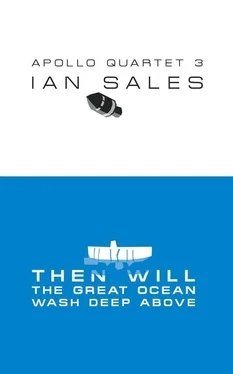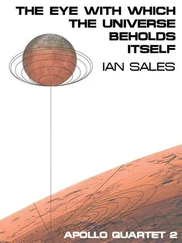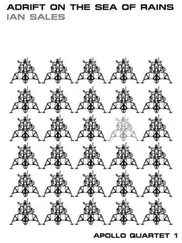McIntyre is not convinced: there’s no light down there thousands of feet below the surface, only what the bathyscaphe carries—and her search lights don’t illuminate much. He remembers previous dives, sitting in that cold steel ball and looking out at a blurred and ghostly landscape which seemed to stretch only yards in each direction before darkness took over, before reality ran out of substance…
And every time, he felt like an astronaut peering out at that grey sand, gazing out at a world which would kill him in a heartbeat.
The first thing Jackie Cochran does the moment she’s settled into her office at the Langley Research Center, the new home of Project Mercury, is send the astronauts make-up from her Jacqueline Cochran Cosmetics range and comprehensive instructions laying out how the Mercury 13 must dress when appearing in public. They’re about to go into space, to do something men have never done, and the Head of the Astronaut Office is telling them to keep their seams straight, their hair dressed and to wear powder and lipstick at all times. But none of them complains. Cobb remembers two years ago, approaching Oklahoma City at the end of her non-stop distance record flight from Guatemala City, trying to get out of her flight suit and into dress, stockings and high heels without losing control of her Aero Commander. It’s expected of them, it’s expected of women.
Proudly displayed on the wall of Cochran’s office is the cover of Life magazine with the thirteen astronauts in evening gowns, one of the photographs taken before the dinner with President Eisenhower. And there, in large white letters next to the masthead, are the words “Jackie’s Space Girls”. Cochran loves it—My space girls, she says proudly. Hart grimaces but won’t rise to the bait. Some of the others, the Dietrich twins, Irene Leverton and K Cagle, gather round the framed cover, reaching out to touch the glass, putting fingers to the evening gowns they wore—they didn’t get to keep them—and there’s laughter and happy compliments, and Cobb sees the group is beginning to fracture.
Cobb knows she will fly, and if it means doing what Cochran tells her to do, then it’s a price worth paying.
When Cochran calls the astronauts into her office halfway through their training, five months after they all moved to Langley, Cobb suspects the worse. If she thought the first flight was hers—she was the first to pass the tests, she has the most flying hours, she and Janey Hart did all the campaigning that made this happen—if Cobb expects the first flight to be hers no questions asked… well, there are rumours flying around that say different. This meeting in Cochran’s office, it has to be about that.
The thirteen of them enter the room. Cochran is behind her desk, she doesn’t rise to her feet. At her shoulder is Walter T Bonney, the PR director. A few of the women have turned up in flightsuits, fresh from training; some are in slacks. They stand around, eager to hear the news, giving each other speaking glances, and Hart reaches out and gives Cobb a sisterly touch on the arm. That hurts, that Hart could think Cobb will be passed over.
But no. Cochran opens her mouth and out spills a lecture, a rant, liberally dosed with expletives, about the need to keep up standards of dress. No flightsuits in the classroom; make-up at all times unless they’re in a cockpit, and even then they put some on before they deplane. She complains she has seen astronauts looking slovenly about the building, and she won’t have it. This is not 1943, it is 1963. The engineers and the scientists, a lot of them are men and they expect women to look and behave like women. The women engineers and scientists, they’re not role models like the Mercury 13, they’re not the reason why this programme exists.
It is a bizarre and filthy-worded tirade, and Cobb can see she is not the only one in the room astonished by it.
Now, says Cochran, visibly calming, I asked you here for another reason. We’re about ready to announce who’s going to be the first American in space.
If there is a senior astronaut, it’s Cobb, but she and Cochran don’t like each other, and they’d argue all the time if Cobb weren’t so unwilling to speak up, even after all the speechifying which got the thirteen of them here. They all know the score, they all know Cobb deserves the first flight, but there’s no real surprise when Cochran says, I’ve spoken to all your instructors, and I’ve even been to see dear old Wernher, and we think, we think the first American in space should be… K.
For several seconds, the room is silent.
Cochran puts her hands together and applauds. Well done, K, she says.
The others crowd around Cagle and congratulate her, hugs and pecks on the cheek. Cobb looks down, feeling like an outsider; she’s disappointed, it’s heartfelt, a burning sensation deep inside, but she comforts herself with the knowledge that God has something greater for her to do yet. She catches a few sympathetic glances thrown her way, then crosses to Cagle and wishes her luck.
Cagle turns to Cochran at her desk and she says, Miss Cochran, thank you so very much. I’m your girl, I believe in you, I trust your judgement in any situation. You have proved we can get what we want, not by pushing, but by winning.
It’s no less astonishing an outburst than Cochran’s, but at least afterwards Cagle has the grace to look embarrassed. Cochran has a smug expression on her face; Cobb refuses to meet her gaze.
Jerrie, Cochran says, I want you as backup for K.
Only if I get the next one, Cobb replies.
Cochran glowers, she opens her mouth but closes it without speaking. She looks down at her desk. You get the next one, she says in a clipped voice, I had you down for the next one, so don’t you go playing games with me.
Later, Cobb thinks it may not be 1943 but it is like it. The men have all gone to war and the Rosie the Riveters are back in the factories, back “picking up the slack”. There’s no WASP because women can’t fly jet fighters or jet bombers, the F-103 and F-107, the B-49 flying wing and supersonic B-59; but women have once again stepped out of the kitchen.
Now that the schedule is set for the first two flights, the nature of the training changes. Cagle and Cobb are busier than ever. In Cobb’s Aero Commander, they fly down to the McDonnell Aircraft plant in St Louis to have a look at the Mercury spacecraft. It’s a frighteningly small vehicle in which to brave the unknown dangers of space, but Cagle fits in it with room to spare. She’ll be wearing a pressure suit, of course, one made to measure. The two of them look in through the hatch and Cobb tries to imagine some hefty jet fighter pilot squeezed into its tight confines.
It’s really happening, Jerrie, isn’t it, says Cagle.
Cobb nods, though she’s wondering why there’s no control stick.
They alternately spend hours in a mock-up of the capsule, learning the function of every switch and dial, not that there are many of them, far less in fact than on the instrument panel of Cobb’s Aero Commander. How to use the periscope, how the environmental control system works, operating the earth-sky camera… They practice on the Air-Lubricated Free-Attitude Trainer, the Multiple-Axis Space Test Inertia Facility, the egress trainer, even flights on the “vomit comet” to experience weightlessness…
This first flight into space by an American will only be a suborbital hop. The Russians have put two men into orbit, but NASA wants to play it safe. The next flight, Cobb’s flight, will be orbital…
On hearing this news she knows that God is still looking out for her.
It is just past 2200 hours by the time they’ve filled the float with 67,000 gallons of aviation fuel, loaded thirty-two tons of steel shot, checked out all the onboard systems, and loaded the plot onto the NAVNET computer. McIntyre is on the fairwater deck abaft of the sail, at ease as the bathyscaphe rolls gently in the swell. He leans against the mast, the US flag snapping above his head, and pines for a cigarette—but with all this gasoline beneath his feet, it’s not safe. Hollow knocks and the murmur of conversation, evidence of industry in some abyssal realm, echo up the access tube. The USS White Sands sits on station two hundred feet away, far enough not to be caught in the conflagration should the Trieste II ’s aviation fuel ignite. Somewhere behind the auxiliary repair dock lies the USS Apache, but her running lights are occluded. There’s a fifteen-foot boat containing a pair of sailors a dozen feet away, and a sailor up on the bow of the Trieste II checking out the steering thruster there. It’s a warm breezy night, a river of stars running across a black sky, a velvety blackness that shrouds the planet from horizon to horizon, blending softly into the slowly rolling waves. It’ll be blacker down below, and it’ll also be cold. Those steel walls may protect against the pressure, but they’re no defence against the chill. Not even all the equipment in the pressure-sphere, not even three guys in close proximity for hours, can stave it off.
Читать дальше












